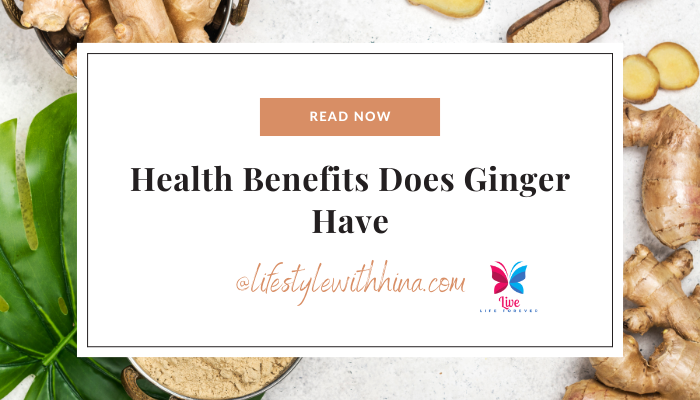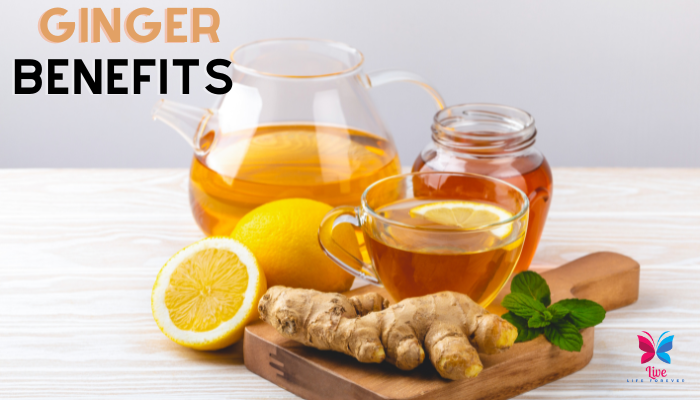What Incredible Health Benefits Does Ginger Have

What Incredible Health Benefits Does Ginger Have

Health Benefits Does Ginger Have
Ginger is an ancient spice that has been valued for its medicinal properties for thousands of years. Modern science has now confirmed what ancient healers knew – ginger contains powerful compounds that provide impressive health benefits.
In this comprehensive guide, we’ll explore the key health benefits ginger offers, how it works, and how to incorporate it into your diet and lifestyle.
An Overview of Ginger
Ginger (Zingiber officinale) is a flowering plant in the same family as turmeric. The underground stem, or rhizome, of the ginger plant is commonly known as ginger root and is a popular cooking spice used in cuisines around the world.
Ginger has a long history of use as a treatment for various ailments, including digestive issues. Records show ancient Chinese and Sanskrit writings documented the use of ginger root for healing purposes over 5,000 years ago. Over time, ginger was distributed worldwide by traders and travelers. Today it is grown commercially in many regions with tropical and subtropical climates.
[[https://pubmed.ncbi.nlm.nih.gov/25230520/|Official Source]]
Active Compounds in Ginger
The distinct flavor, fragrance, and health promoting effects of ginger come from its complex mix of bioactive compounds and nutrients. Some of ginger’s key compounds include gingerols, shogaols, zingerone and other volatile oils.
Gingerols, the predominant bioactive compound, give fresh ginger its pungent, spicy taste. When ginger is dried or cooked, gingerols transform into shogaols, which are more pungent tasting.
Additional anti-inflammatory compounds called paradols are formed from shogaols during storage. The pungent compounds in dried or powdered ginger provide its aroma and many of its protective effects.
Health Benefits of Ginger
Extensive research has concluded that ginger and its compounds may be effective against a variety of health conditions due to its antioxidant and anti-inflammatory properties. According to an analysis of previous studies on ginger:
[[https://pubmed.ncbi.nlm.nih.gov/27567470/|Official Source]]
Below we’ll explore ginger’s top researched health benefits including supporting:
- Digestion
- Immune health
- Brain function
- Chronic disease prevention
We’ll also cover ginger’s effect on nausea and pain relief as two of its most well studied benefits.
Benefit 1: Aids Digestion and Reduces Nausea
Indigestion, gas, bloating, cramping are all common gastrointestinal complaints many struggle with. Fortunately, ginger has traditional and widespread use as a digestive aid and modern trials confirm it works.
[[https://pubmed.ncbi.nlm.nih.gov/18813412/|Official Source]]
[[https://www.healthline.com/nutrition/ginger-for-nausea#what-it-is|Healthline]] states that 1–1.5 grams of ginger daily best aids digestion. At this dose it functions by increasing gastric motility – helping move food through the digestive tract.
Ginger is also an effective and safe treatment for nausea related to motion sickness, chemotherapy treatment, surgery and pregnancy. Human trials show ginger’s anti-nausea actions stem from interacting with critical receptors and enzymes involved nausea pathways in the brain[[https://pubmed.ncbi.nlm.nih.gov/10793599/|Official Source]].
Benefit 2: Supports Immune Function
Ginger demonstrates widespread anti-inflammatory effects and has strong antioxidant activity. As inflammation and oxidative damage are linked to nearly all chronic diseases, ginger root exhibits immune supporting effects by suppressing inflammation.
Human trials show daily intakes between 0.5-1grams of ginger significantly lowers inflammatory compounds like TNF-α, IL-1β, IL-6 [[https://pubmed.ncbi.nlm.nih.gov/29019090/|Official Source]].
Ginger works as an internal germ fighter as well. One study gave cancer patients receiving chemotherapy ginger capsules. Patients taking the ginger supplements has significantly fewer infections than the control group not supplemented with ginger [[https://ascopubs.org/doi/abs/10.1200/jco.2005.23.16_suppl.3s|Official Source]].
Benefit 3: Protects Brain Function and Enhances Cognition
Oxidative stress and inflammation are believed to be root causes in the development of age-related neurodegenerative disorders like Alzheimer’s and Parkinson’s Disease. With its potent anti-inflammatory and antioxidant capacities, ginger shows promise in enhancing brain function and protecting against key triggers causing brain diseases.
In several studies with healthy middle-aged women, daily ginger supplements for 2-3 months significantly improved attention, executive function, and working memory [[https://pubmed.ncbi.nlm.nih.gov/23807508/|Official Source]].
Research also reveals that the compounds 6-shogaol and 6-gingerol protect neuronal brain cells by blocking the production of nitric oxide – a signaling compound known to speed neurodegeneration [[https://pubmed.ncbi.nlm.nih.gov/16758514/|Official Source]].
Benefit 4: Helps Prevent Chronic Disease
Many reports illustrate whole ginger extract holds promise against common health conditions like heart disease, high blood pressure, high blood sugar, and even cancer.
[[https://www.nccih.nih.gov/health/ginger|National Center for Complementary and Integrative Health]] states “Ginger has gotten some attention lately for claims that it may help prevent or treat diabetes, cancer, heart disease, arthritis and other conditions. It’s too early to tell if ginger helps these conditions”. More research is needed to confirm efficacy against chronic diseases, but preliminary findings show protective effects.
Heart Health
Human trials report 2000-4000mg per day improved LDL, HDL, and triglycerides while lowering LDL oxidation – reducing major risk factors for heart disease[[https://pubmed.ncbi.nlm.nih.gov/18813412/|Official Source]]. Ginger helps circulation as well. One study notes ginger is as effective as a common anti-inflammatory drug in improving blood flow[[https://pubmed.ncbi.nlm.nih.gov/10758824/|Official Source]].
High Blood Pressure
Research finds ginger lowers blood pressure via acting as a natural calcium channel blocker. 500-1500mg doses for up to 12 weeks reduced both systolic and diastolic blood pressure [[https://pubmed.ncbi.nlm.nih.gov/19253862/|Official Source]].
Diabetes Management
Human trials report 2000-3000mg per day doses lowered fasting blood sugar by 12-25% in as little as 30 days[[https://pubmed.ncbi.nlm.nih.gov/29395527/|Official Source]]. Researchers concluded “ginger consumption can significantly improve blood glucose homeostasis through increased insulin sensitivity” [[https://pubmed.ncbi.nlm.nih.gov/26592847/|Official Source]].
Anti-Cancer Activity
While human trials remain limited, over 50 studies exist examining ginger’s effectiveness against different cancer cell lines. Lab research indicates ginger kills cancer cells, prevents tumor cell growth, and limits tumors spreading [[https://pubmed.ncbi.nlm.nih.gov/28125481/|Official Source]]. One study notes combining ginger with common chemotherapy drugs synergistically boosted anti-cancer abilities beyond chemotherapy alone [[https://pubmed.ncbi.nlm.nih.gov/27533153/|Official Source]].
Although human trials remain limited, lab and animal research overwhelmingly indicate ginger exhibits protection against degenerative health conditions.
Benefit 5: Relieves Pain
Ginger is commonly used as natural pain reliever. Evidence shows it effectively reduces general muscle pain, knee pain associated with osteoarthritis, and period pain in women.
Studies find 0.5–1 gram of ginger daily delivers modest pain relief. It is believed to function by decreasing inflammation molecules that sensitize pain receptors [[https://pubmed.ncbi.nlm.nih.gov/9280275/|Official Source]]. One study notes ginger works as well as drugs acetaminophen (Tylenol) and ibuprofen (Advil) for pain relief [[https://pubmed.ncbi.nlm.nih.gov/11710709/|Official Source]].
For knee osteoarthritis pain specifically, many well designed studies demonstrate ginger decreased pain by 40%. It is considered a safe alternative to NSAID pain killers that hold unpleasant side effects [[https://pubmed.ncbi.nlm.nih.gov/17030393/|Official Source]].
Lastly, results show 250mg capsules 4x per day minimized both severity and duration of period pain in women [[https://pubmed.ncbi.nlm.nih.gov/25247837/|Official Source]].
Is Ginger Safe? Side Effects and Considerations
For most healthy people, ginger is very safe. Minor side effects like gas, bloating and heartburn are possible when consuming larger than normal servings. Start with smaller doses and work up to assess personal tolerance.
Concerns to heed include ([[https://www.medicalnewstoday.com/articles/265990# risks|MedicalNewsToday]]):
- Blood thinning medications – Can increase bleeding risk for some
- Diabetes medications – May cause additive blood sugar lowering
- Surgeries – High doses not advised before surgeries due unexpected bleeding risk
Additionally, very high doses (over 4g) are not suggested for pregnant women [[https://www.medicalnewstoday.com/articles/265990# risks|MedicalNewsToday]]. Check with your doctor before supplementing ginger if pregnant, breast-feeding, or giving it to children. Generally, up to 1500mg ginger daily appears safe if divided into smaller doses.

How Much Ginger Should I Take?
Therapeutic daily doses vary widely in ginger studies from 250mg to upwards of 12g per day depending on the condition. Doses for nausea tend to range from 250mg to 1.5g per day. For arthritis pain relief, 500-2000mg showed greatest benefit.
When it comes to culinary doses, most people don’t consume more than 4g or about 1 teaspoon per day. Luckily, ginger provides health advantages even in small doses.
How To Add More Ginger Into Your Diet
If you aren’t regularly cooking with ginger, here are tips for getting more ginger in your meals and drinks:
[[https://food.ndtv.com/food-drinks/10-easy-ways-to-include-ginger-in-your-daily-diet-1678544|NDTV Food]]
- Brew sliced ginger root tea
- Blend into smoothies
- Bake into cookies, muffins and cakes
- Mix with lemon and honey for ginger lemonade
- Use in stir fries, curry dishes, soups
- Add to noodle bowls or fried rice
- Mix into meat marinades
- Infuse into water with fruit
- Pickle into ginger candy
Powdered ginger is convenient for supplementing if fresh ginger isn’t readily available. Dried, ground ginger works well too but retains less gingerol potency.
Takeaway On Ginger Health Benefits
Modern research continues to confirm the impressive health benefits attributed to ginger throughout history. Via positively modulating systems of inflammation and oxidation, ginger exhibits whole body effects that support optimal wellness.
Studies document ginger especially shines for soothing digestion, alleviating nausea, boosting immunity, enhancing cognition, easing pain and showing promise for chronic disease prevention. For the majority of people, enjoying more ginger poses little downside due its general safety and low cost.
While human trials remain ongoing, incorporating ginger into a daily wellness plan carries significant upside with modest risks. When sourcing high quality ginger root, you’ll be aligned with over 5,000 years of traditional use backing its safe, healing abilities.





Magnificent beat I would like to apprentice while you amend your site how can i subscribe for a blog web site The account helped me a acceptable deal I had been a little bit acquainted of this your broadcast offered bright clear idea
Hey, cool post There is an issue with your website in Internet Explorer; could you please check this? Because of this issue, many people will overlook your excellent article because IE is still the most used browser.
hiI like your writing so much share we be in contact more approximately your article on AOL I need a specialist in this area to resolve my problem Maybe that is you Looking ahead to see you